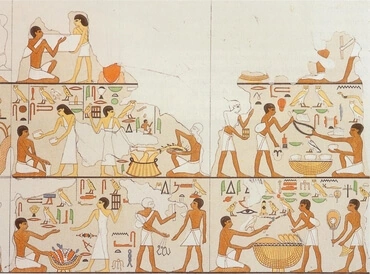Egypt

In the Bible, Egypt represents knowledge and the love of knowledge. In a good sense that means knowledge of truth from the Lord through the Bible, but in a natural sense it simply means earthly knowledge to be stored up and possessed. And even knowledge from the Bible is not always good: If we learn them with the goal of making them useful, then they are filled with angelic ideas. But they lack purpose when they are learned only for the sake of knowing things or for the reputation of being learned. So Egypt is a place you go to learn things, but to become heavenly you have to escape the sterile "knowing" and journey to the land of Canaan, where the knowledge is filled with the internal desire for good. It's interesting that when Egypt was ruled by Joseph, it was a haven for his father and brothers. This shows that when a person's internal mind rules in the land of learning, they can learn much that is useful. But eventually a pharaoh arose that didn't know Joseph, and the Children of Israel were enslaved. The pharaoh represents the external mind; when it is in charge the excitement and self-congratulation of knowing can reduce the internal mind to a type of slavery. The mind - like the Children of Israel - ends up making bricks, or man-made falsities from external appearances.
Arcana Coelestia # 6672
6672. Verses 15-21 And the king of Egypt said to the midwives of the Hebrew women, of whom the name of the one was Shiphrah, and the name of the other Puah - he said, When you act as midwives to the Hebrew women and see them on the birthstools, if it is a son you shall kill him; and if it is a daughter, let her live. And the midwives feared God, and did not do as the king of Egypt spoke to them; and they kept the boys alive. And the king of Egypt called the midwives, and said to them, Why do you act like that and keep the boys alive? And the midwives said to Pharaoh, Because the Hebrew women are not like the Egyptian women, for they are full of life; before the midwife comes to them they have given birth. And God dealt well with the midwives; and the people multiplied and became very numerous. And so it was, because the midwives feared God, that He made them houses.
'And the king of Egypt said to the midwives of the Hebrew women means an influx from separated factual knowledge into the natural where the Church's true factual knowledge resided. 'Of whom the name of the one was Shiphrah, and the name of the other Puah' means the nature and state of the natural where that factual knowledge resided. 'He said, When you act as midwives to the Hebrew women and see them on the birthstools' means a discernment of the truth and good flowing from the internal into that factual knowledge. 'If it is a son you shall kill him' means that if it was a form of truth, they were to destroy it in whatever way they could. 'And if it is a daughter, let her live' means that they were not to destroy it if it was a form of good. ' And the midwives feared God' means that true factual knowledge was kept safe because it was kept so by the Divine. 'And did not do as the king of Egypt spoke to them' means that the intention of those under the influence of falsities was not carried out. 'And they kept the boys alive' means that the truths, being the truths of good, were preserved. 'And the king of Egypt called the midwives means that those under the influence of falsities planned a course of action against those who had true factual knowledge in the natural. 'And said to them, Why do you act like that and keep the boys alive?' means anger that the truths were not destroyed. 'And the midwives said to Pharaoh' means a discernment regarding that true factual knowledge in the natural. 'Because the Hebrew women are not like the Egyptian women' means that the Church's factual knowledge is not like the factual knowledge which is at odds with it. 'For they are full of life' means that it has spiritual life within it. 'Before the midwife comes to them they have given birth' means that the natural knows nothing until life is imparted to it. 'And God dealt well with the midwives' means that the natural was blessed by the Divine. 'And the people multiplied and became very numerous' means that within the natural, truths were constantly emerging and so increasing. 'And so it was, because the midwives feared God' means because true factual knowledge was being kept safe by the Divine. 'That He made them houses' means that they were arranged into a heavenly form.






